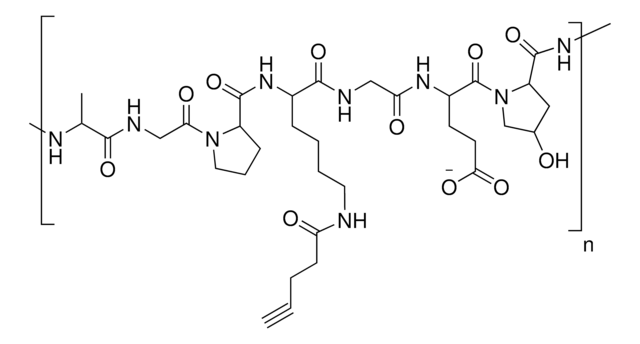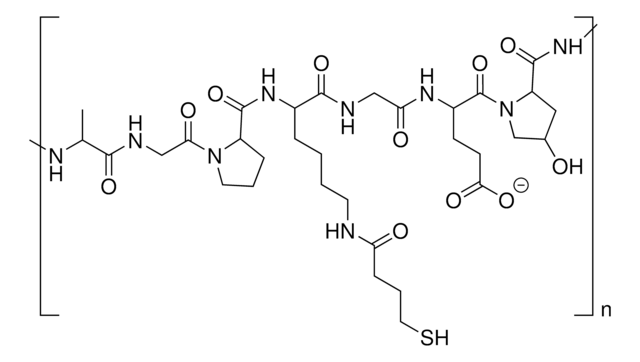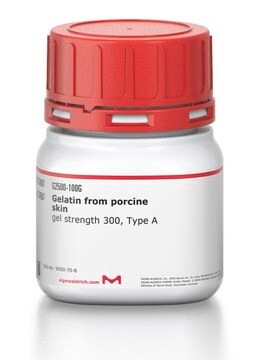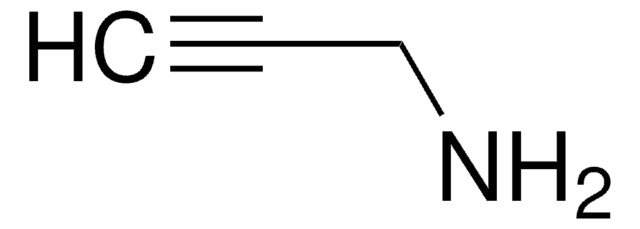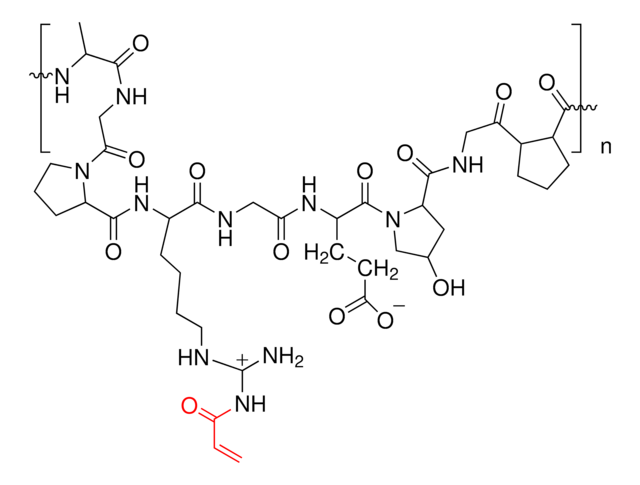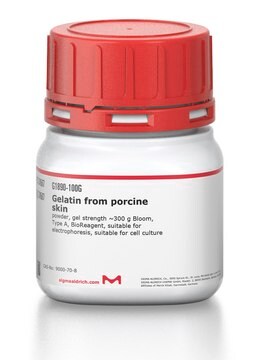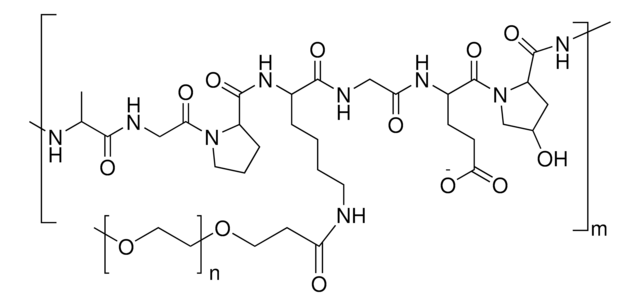907723
Azide functionalized gelatin
degree of substitution >80%
Sinonimo/i:
Azide functionlized gelatin, Azide-modified gelatin, Clickable gelatin
Autenticatiper visualizzare i prezzi riservati alla tua organizzazione & contrattuali
About This Item
Codice UNSPSC:
12352125
NACRES:
NA.23
Prodotti consigliati
Descrizione
Degree of substitution: greater than 80% by TNBS method
NMR: Conforms to structure
Stato
powder
Colore
white to pale yellow
Temperatura di conservazione
−20°C
Categorie correlate
Descrizione generale
Due to its biodegradablity and biocompatibility, gelatin is routinely used in hydrogels for biomedical applications such as drug delivery, tissue engineering, and 3D bioprinting. Gelatin-based hydrogels are synthesized by the crosslinking of functionalized gelatins. Depending on the identity of the functional groups, several different processes can be used to synthesize crosslinked gelatin hydrogels, including radical-based (either thermal or photochemical) and click chemistry methods. Azide-functionalized gelatin can be used in the synthesis of hydrogels using click chemistry with alkyne-containing substrates.
Codice della classe di stoccaggio
11 - Combustible Solids
Classe di pericolosità dell'acqua (WGK)
WGK 3
Punto d’infiammabilità (°F)
Not applicable
Punto d’infiammabilità (°C)
Not applicable
Scegli una delle versioni più recenti:
Certificati d'analisi (COA)
Lot/Batch Number
Non trovi la versione di tuo interesse?
Se hai bisogno di una versione specifica, puoi cercare il certificato tramite il numero di lotto.
Possiedi già questo prodotto?
I documenti relativi ai prodotti acquistati recentemente sono disponibili nell’Archivio dei documenti.
Gelatin hydrogels via thiol-ene chemistry
Russo L, et al.
Monatshefte fur Chemie / Chemical Monthly, 147, 587-592 (2016)
Vinh X Truong et al.
Biomacromolecules, 16(7), 2246-2253 (2015-06-10)
In this study, we present a method for the fabrication of in situ forming gelatin and poly(ethylene glycol)-based hydrogels utilizing bioorthogonal, strain-promoted alkyne-azide cycloaddition as the cross-linking reaction. By incorporating nitrobenzyl moieties within the network structure, these hydrogels can be
Thiol-yne `click?/coupling chemistry and recent applications in polymer and materials synthesis and modification.
Andrew B. Lowe
Polymer, 55 (2014)
Sandeep T Koshy et al.
Advanced healthcare materials, 5(5), 541-547 (2016-01-26)
Injectable gelatin hydrogels formed with bioorthogonal click chemistry (ClickGel) are cell-responsive ECM mimics for in vitro and in vivo biomaterials applications. Gelatin polymers with pendant norbornene (GelN) or tetrazine (GelT) groups can quickly and spontaneously crosslink upon mixing, allowing for
Masato Tamura et al.
Scientific reports, 5, 15060-15060 (2015-10-10)
This paper describes the generation of "click-crosslinkable" and "photodegaradable" gelatin hydrogels from the reaction between dibenzocycloctyl-terminated photoclevable tetra-arm polyethylene glycol and azide-modified gelatin. The hydrogels were formed in 30 min through the click-crosslinking reaction. The micropatterned features in the hydrogels were
Il team dei nostri ricercatori vanta grande esperienza in tutte le aree della ricerca quali Life Science, scienza dei materiali, sintesi chimica, cromatografia, discipline analitiche, ecc..
Contatta l'Assistenza Tecnica.